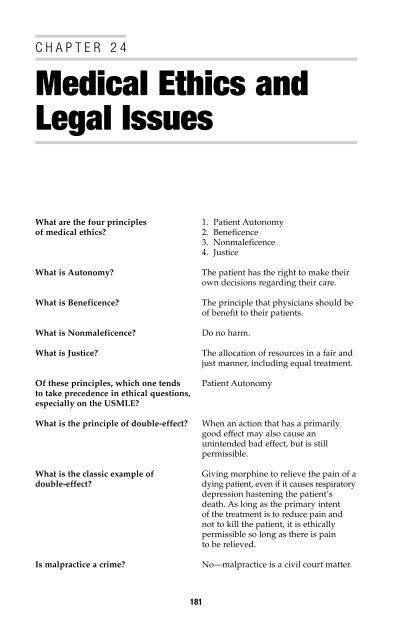Behavioral Science
You also want an ePaper? Increase the reach of your titles
YUMPU automatically turns print PDFs into web optimized ePapers that Google loves.
Clinical Practice and Difficult Situations 179<br />
Which of the steps above is most likely<br />
to be asked on the USMLE?<br />
How do you use an interpreter?<br />
Is it OK to allow a child or family<br />
member to act as an interpreter?<br />
What is patient adherence (formerly<br />
called “compliance”)?<br />
What are barriers to patient adherence?<br />
How might a physician make a<br />
treatment plan less complicated?<br />
What is an open-ended question?<br />
What is a close-ended question?<br />
Finding out how much the patient<br />
knows about their illness (no 2). It’s<br />
always good to get information first so<br />
you can frame the discussion.<br />
Speak to the patient, not the interpreter.<br />
Speak clearly, being sure to pause<br />
intermittently to allow the interpreter<br />
to convey information to the patient.<br />
No, not if it can be helped. Even if the<br />
family member is fluent, it is good to at<br />
least offer to get an interpreter for the<br />
patient. Family members may also have<br />
their own agenda that may unduly<br />
influence the patient.<br />
The degree to which the patient follows<br />
the advice of the treating physician<br />
Complicated medical regimens<br />
Poor physician-patient rapport<br />
Lack of patient involvement in the<br />
treatment plan<br />
Infrequent appointments<br />
Poor support structure/inadequate help<br />
at home<br />
The treatment plan can be simplified by<br />
limiting:<br />
• The number of medications the<br />
patient is taking<br />
• The number of times the medications<br />
is taken per day<br />
• The number of changes made at each<br />
visit<br />
A question that is intentionally left<br />
broad, such that the patient can say<br />
what is really on their mind—“What<br />
brings you into the clinic today?” or<br />
“Tell me about your stomach pain.”<br />
A very specific question with a discrete<br />
answer. Used to get more detail—<br />
“Did you have nausea?” “How<br />
frequently do you have pain?”<br />
This is also useful with seductive<br />
or disorganized patients.



